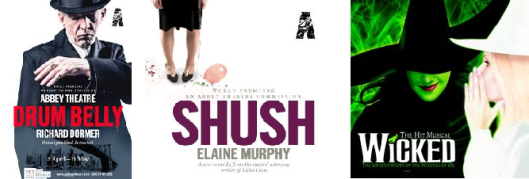 Mimetic Theatre: (L to R) Drum Belly, Shush and Wicked.
Mimetic Theatre: (L to R) Drum Belly, Shush and Wicked.
‘Instead of a linear development, they present their author’s intuition of the human condition by a method that is essentially polyphonic; they confront their audience with an organised structure of statements and images that interpenetrate each other and that must be apprehended in their totality, rather like the different themes in a symphony, which gains meaning by their simultaneous interaction.’
Martin Esslin – The Theatre of the Absurd.
In the last year as my research into theatre has deepened one question has repeatedly resurfaced in my mind; Is there a future for modern drama as an art form with relevance beyond the narrow band of ritual theatre goers and practitioners? As I have once again started to attend the theatre on a regular basis it is very difficult not to come to the conclusion that in a very real sense contemporary theatre is still wedded to the traditional methodology of mimetic re-enactment. I am constantly surprised by the sheer lack of experimentation or innovative approaches within contemporary Irish theatre. I wish to propose that the art form I love so much has effectively stagnated.
Theatre both in an Irish and a wider international context seems to be trapped in a bizarre time warp, still regurgitating the dramaturgy of traditional dramatic production. Theatre in fact has not recovered from the twin onslaught of television and film. While the sixties did briefly ignite an innovative wave of new theatrical practises in response to the small squawking box in the corner of every living room, this experimentation seems to have withered and died. So often in the contemporary theatre when we are presented with a non-mimetic paradigm it is a revival of one of the classic Absurdist plays and even in this context they are viewed by many as an interesting curiosity, an outlier, and not a means for the future development of Irish theatre. This veracious challenge has only been intensified by the introduction of digital technology. Ten years ago practitioners often made theatre due in part due to the prohibitive expense of film. Now the opposite is true with a digital film substantially cheaper to produce than a full theatrical production even on the smallest scale. With digital film it is easier for the author to maintain the integrity of the final output of their work as well as controlling its distribution. Most contemporary writers who wish to produce an accurate vision of their artistic project tend towards these more solid mediums. Witness Martin McDonagh moving so quickly away from the stage and into motion pictures. It is not alarmist to suggest that the next generation of writers will bypass theatre completely in favour of a more internet-friendly model and methodology.
Another manifestation of this destruction of mimetic theatre beneath the assault of television and cinematic drama is the almost complete domination of the musical in the mainstream commercial theatres of the London’s West End and New York’s Broadway. The non-musical exceptions are often revivals or extremely long running perennial favourites. This is not theatre as art. It is theatre as entertainment. Whilst art can be entertaining, when entertainment is the primary goal of the theatrical production true artistic merit rarely follows.
The Experimenters: (L toR) Waiting For Godot, No Exit and Rhinoceros.
The phenomenon where most new plays are firmly located in the paradigm of realism is equally valid when applied to our own national theatre. Drum Belly and Shush are highlighted as the two major ventures into new writing from 2013 at Dublin’s Abbey Theatre. The former could be considered a mob story, the latter a soap opera. Both are mainstream, conservative and – speaking strictly in regard to their approach to writing for theatre – un-innovative and in my humble opinion outdated. Instead we are presented with Good Fellas and Coronation Street on stage. Experimentation is absent.
Drum Belly Trailer
The conclusion must be drawn that theatre throughout the passage of the 20th century has not changed significantly. In attempting to produce realist dramas we are simply continuing the art form in the same standard paradigm exemplified by Shakespeare. What other branch of artistic endeavour has advanced so little in the corresponding time. Painters do not paint now in the same manner as the Impressionists. Film makers do not make films like Charlie Chaplin and Buster Keaton. Only in theatre does traditionalism remain so entrenched. With the invention of the camera painters reacted with abstract expressionism. Theatre likewise has to react to its obvious challengers. In terms of pure accurate reproduction television and film are far better mediums for representing mimesis. We as theatre practitioners must develop a new language if we are to make our chosen medium a true art form. We must break out of the middle-aged, middle class, audience stereotype, and make theatre that is more of art and less of extravagance.
Beckett on Film – Play
I believe that vigorous experimentation and more particularly close attention to the model offered by the Theatre of the Absurd offer a means forward. Undoubtedly realist theatre still has its place. It can be an endeavour in its own right both in a political and community-building sense. It can be a means of exploration through performance. But in facing the challenges of the 21st century both in terms of technology and a highly postmodern cultural environment the art of theatrical experimentation has a lot more to offer. It is strangely telling that it still remains missing from our most important stages.
Works Cited
Esslin, Martin. The Theatre of the Absurd. New York: Vintage Books, 2004. Print.
Beckett on Film – ‘Play’ (Excerpt). Youtube.com. 13 Sep. 2012. Web. 10 Jan. 2014.
Drum Belly by Richard Dormer (Trailer). Youtube.com. 20 Mar. 2013. Web. 10 Jan. 2014.

